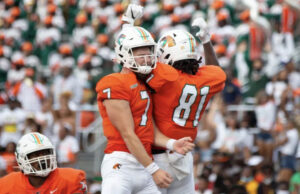
Jackson State football coach and pro football Hall of Famer Deion Sanders wants to increase the exposure of historically Black colleges and universities. He believes a part of that exposure includes players in the Southwestern Athletic Conference having their names on the back of jerseys.
After the Rattlers fell short to JSU — a 7-6 loss in the season-opening Orange Blossom Classic — Sanders went on a rant about players having their names on the back of their jerseys.
“That’s the kind of stuff we take for granted,” Sanders said in a viral Instagram post. “I don’t. I’m very detailed. That guy worked his butt off, did what he had to do, changed his whole composite of his thought process. We could at least put his darn name on the back of his jersey.”
This minor detail could impact student-athletes in a major way in light of the new NCAA policy — effective as of July 1— that allows college athletes to get paid for using their name, image and likeness. Florida A&M University, like many other HBCUs, is a school teeming with tradition.
At the end of Sanders’ challenge, he volunteered to pay for the entire SWAC to add players’ names to their jerseys.
“What is that, an extra $5 a jersey?” Sanders said. “I’ll take care of it for the whole SWAC if they do it.”
Kortne Gosha, FAMU’s athletic director, noted that it’s not FAMU style to have players’ names on their jerseys.
“It’s not necessarily an economics thing. Certain programs have certain traditions. We’re Florida A&M; we don’t do that,” Gosha said. “I think certain peers within the SWAC may have a different set of circumstances. For some institutions, it may be an economic thing; I think it’s a bit insensitive to lump everybody together as if it’s a resource issue.”
A fraction of FAMU football players are convinced that it would be easier for loved ones to find them on the field if names were added to their jerseys.
“I agree to disagree with the statement because if it were that easy, it’d be done, but I agree because if scouts or your family are looking for you, they can’t because another person might have the same number,” said Terrell Jennings, a defensive back at FAMU. “I believe we do need our names on the back because we work so hard for our family.”
Penn State, one of college football’s perennial powerhouses, did not put players’ names on jerseys. And their late legendary coach, Joe Paterno, explained why.
“It’s the name on the front of the jersey that matters most, not the one on the back.”
Gosha doesn’t expect Sanders’ position will change how SWAC schools dress their players.
“He has an opinion for his team and his coaches, and he wants to see their names, and that’s perfectly fine. We are the No. 1 HBCU in the country. We do things different, we ‘Bragg’ different,” Gosha said.